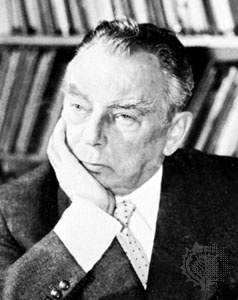Kästner, Erich
German author
born Feb. 23, 1899, Dresden, Ger.
died July 29, 1974, Munich
 German satirist, poet, and novelist who is especially known for his children's books. He was the most durable practitioner of the style of witty, laconic writing associated with the highbrow cabaret, the Berlin weekly Die Weltbühne (“The World Stage”), and the Neue Sachlichkeit (New Objectivity) movement of the mid-1920s.
German satirist, poet, and novelist who is especially known for his children's books. He was the most durable practitioner of the style of witty, laconic writing associated with the highbrow cabaret, the Berlin weekly Die Weltbühne (“The World Stage”), and the Neue Sachlichkeit (New Objectivity) movement of the mid-1920s.Kästner studied at Rostock, Leipzig, and Berlin to become a teacher. Later, as a journalist, he became a free-lance writer (1927). Four volumes of light but fundamentally serious poetry appeared before 1933. He also wrote the remarkable tragic novel Fabian (1931). His children's books are notable for their humour and respect for the child's moral seriousness. The most famous of these, Emil und die Detektive (1929; Emil and the Detectives), was several times dramatized and filmed. Prevented by the Nazis from publishing in Germany (1933–45), he printed his works in Switzerland. After the war, Kästner became magazine editor of Die Neue Zeitung of Munich and subsequently founded a children's paper. From 1952 to 1962 he was president of the German branch of PEN, an international organization of writers. His post-World War II works are characterized by a greater emphasis on social philosophy but do not sacrifice their elegance and entertaining qualities. These include Das doppelte Lottchen (1950; “The Double Lottie”); Zu treuen Händen (1950; “Into Faithful Hands”); the play Die Schule der Diktatoren (1956; “The School of Dictators”); and Als ich ein kleiner Junge war (1957; “When I Was a Young Man”). Kästner's collected works, Gesammelte Schriften, 7 vol., appeared in 1959.
- Nicolas Louis de Lacaille
- Nicolas-Louis Robert
- Nicolas-Louis Vauquelin
- Nicolas Malebranche
- Nicolas, Marquis De Maillebois Desmarets
- Nicolas Perrot
- Nicolas Pineau
- Nicolas Poussin
- Nicolas Sarkozy
- Nicolas Schöffer
- Nicolas-Théodore de Saussure
- Nicolaus Copernicus
- Nicolaus Steno
- Nicolau Tolentino de Almeida
- Nicol, Davidson
- Nicole Kidman
- Nicole, Pierre
- Nicolet, Jean
- Nicolle, Charles-Jules-Henri
- Nicollet, Joseph Nicolas
- Nicolls, Richard
- Nicolson, Sir Harold
- Nicolás Antonio
- Nicolás Bravo
- Nicolás de Ovando